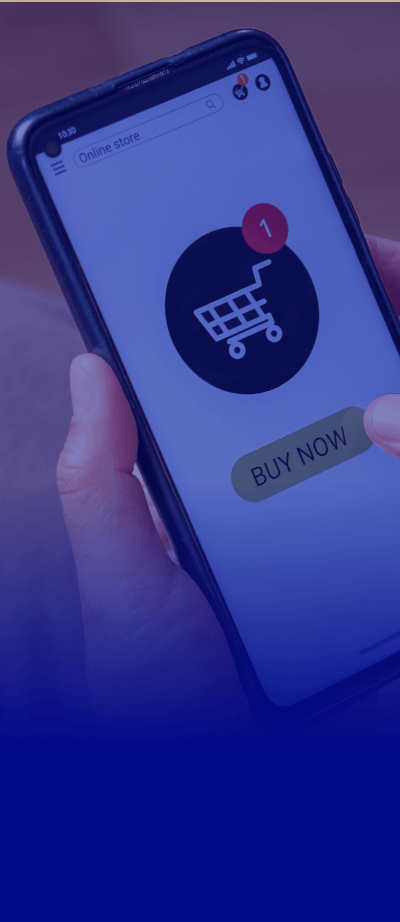 Consumer insightsand perceptions in 2024
Consumer insightsand perceptions in 2024
In recent years, there have been significant changes in the way businesses operate, mainly driven by technological advancements and evolving customer expectations. To understand these changes better, Zoho surveyed 401 individuals across Australia to gain deeper insights into consumers' experiences, focusing on various aspects of their interactions with brands. This includes insights about the customer service they receive, how their perceptions change in response to various factors, and the rising impact of AI in the world.
Key findings from the survey

Around one in three shoppers will abandon a purchase to avoid adding yet another app or account.

Around six in ten respondents said they avoided sharing feedback with a brand because they think their feedback doesn't matter.

Only one in four people will pay extra for better customer service.

46% of respondents acknowledged the value of having a human support agent, yet indicated that the absence of human representatives wouldn't influence their brand perception.

Almost six in ten respondents said that they would opt for brands that display pricing upfront rather than seeking better deals elsewhere.

People are more than twice as likely to trust a stranger's review over an influencer's.
Role of customer service
People are more likely to complete post-purchase surveys if they're kept concise
While it's no secret that most people aren't keen on writing detailed post-purchase feedback, finding a way to keep it short and easy is key. By using star or number-based surveys, brands can encourage more participation with minimal effort from customers.
Customers are unsure if spending more means better service
While there's a common belief that paying a higher price means getting a better treatment from a brand, it's definitely not always the case. Our survey respondents have mixed experiences.
Customers still prefer the option to contact a human agent, but many won't judge brands that rely on chatbots
While most people agree that it's ideal to have a human customer support agent available, many are still receptive to chatbots. In fact, the majority said they won't necessarily hold it against a brand if they don't offer human support.
Only one in four customers will pay for superior service
Consumers expect exceptional customer service as a standard practice. While the majority says superior experiences are an incentive, price remains the primary factor in their buying decisions.
You can't keep customers hanging
Time is crucial for businesses, and our respondents agree. Most believe 30 minutes is the maximum reasonable wait time for an initial response from a representative.
Demand for 24/7 support is soaring
Around half of respondents felt the need for 24/7 customer service depends on the situation, while a strong 40% considered it essential. This highlights a growing expectation for immediate and round-the-clock accessibility.
How do you feel about follow-up surveys after a purchase?
50.87%
I prefer to fill them only if it's a very short star/number rating based survey.
33.42%
I always fill them! I generally use such chances to share my experience.
9.73%
I fill them only if it isn't mandatory for all questions to be answered.
5.99%
I never respond to follow-up surveys.
In your experience, did the level of customer service you received from a company vary based on your spending?
43.14%
I haven't noticed any difference in customer service based on spending.
33.42%
I've always received better service when I've spent more money with a company.
23.44%
It's hard to tell, but there have been a few instances when it seemed like I got better treatment because I spent more.
How important is it to you that a brand has to provide a human representative for customer service over chatbots?
46.13%
Always good to have a human. But if a brand doesn't offer human support reps, it won't affect my perception of a brand.
42.14%
It's essential. I wouldn't trust a brand that only offers automated support/chatbots.
7.98%
Chatbots should be a default in this time and age. I won't trust a brand that doesn't offer automated support.
3.74%
I'd rather prefer to get all my answers through a chatbot over a human.
Will you pay extra if you're guaranteed to get a better customer experience?
45.39%
A better customer experience might influence me, but price remains a major factor.
30.67%
I don't pay extra for a better customer experience. I expect great support by default.
23.94%
I'm always willing to pay extra for guaranteed better customer service.
When contacting customer support through email or chat, how long do you consider it reasonable to wait for a first acknowledgement from a representative?
21.95%
Instantly
37.41%
Less than 30 minutes
13.47%
30 - 60 minutes
8.73%
1 - 2 hours
7.73%
2 - 6 hours
2.00%
6 - 12 hours
7.23%
12 - 24 hours
1%
24 - 48 hours
0.50%
48 hours +
How important is it that a brand's customer service is available 24/7?
45.89%
Somewhat important: It depends on the severity of the issue.
39.65%
Extremely important: I need to be able to contact customer service at all hours of the day in case something happens.
14.46%
Not important: I can just contact them during their stated hours of service.
Shifts in brand perception
How can a brand recover from a negative first impression?
While first impressions matter, they aren't set in stone. It's always possible to change negative perceptions and rebuild a positive image for your brand. Our findings reveal that offering competitive pricing or a free trial is an effective strategy to entice customers to try your product or service.
A majority think their feedback doesn't matter
One of the key ways for brands to improve is by gathering feedback from existing customers. But customers often don't share their feedback because they believe brands won't act on it. It's time to change that perception. Demonstrate that you value and act on customer feedback to build trust and encourage more open communication.
Brand values and mission aren’t a major deciding factor for many
While most people agree that it's ideal to have a human customer support agent available, many are still receptive to chatbots. In fact, the majority said they won't necessarily hold it against a brand if they don't offer human support.
Consider a situation where you changed your initial negative opinion about a brand and decided to buy from them. What is most likely to have influenced your decision?
31.67%
The offered a very competitive price, which is too hard to ignore.
27.18%
They offered me a free trial or sample to test the product.
22.69%
They followed up with me regularly and answered all the questions I had at the right time.
14.46%
I saw the brand taking responsibility for a mistake and making an effort to rectify it.
3.99%
I saw the brand being endorsed by a social media influencer or a friend I trust.
Have you ever avoided giving feedback to a company because you felt it wouldn’t make a difference?
61.85%
Yes
38.15%
No
How important are a brand's values and mission to your purchasing decisions?
56.61%
Somewhat important: I consider a brand's values, but they will not be the deciding factor.
29.93%
Extremely important: I prioritise brands whose values align with my own.
13.47%
Not important: I only give value to quality, price, and features when making purchases.
The rise of AI
People are embracing AI in customer support
As more businesses are adopting AI-powered solutions, customers are increasingly accustomed to interacting with AI.
AI's top perk during shopping
When asked about the biggest advantage of tailoring shopping experiences with AI, a majority highlighted AI's ability to quickly and accurately identify desired products as a key benefit.
Nearly two in five people trust AI recommendations over friends' suggestions
Even as AI becomes increasingly prevalent, people still trust their social circle for advice. While nearly two in five people rely on AI recommendations, human recommendations remain the preferred choice for many.
Do you consider AI-powered customer support to be the new normal?
46.38%
Yes, I believe AI-powered customer support is used by most brands.
30.67%
No, I prefer traditional human customer support interactions.
22.94%
I haven't noticed the difference between AI and traditional human customer support.
What do you think is the key benefit of a brand using AI to personalise your shopping experience?
40.40%
Efficient identification of exactly what you need
27.43%
Faster discovery of desired products.
16.96%
Increased satisfaction from finding the perfect match
15.21%
Enhanced discovery of new and relevant products
If you were buying a new product, how likely are you to trust an AI recommendation based on your preferences over a suggestion from a friend?
60.35%
I would prefer my friend's suggestion.
39.65%
I would trust the AI recommendation.
Approach to privacy and security
Around one in three shoppers will pass on a purchase to avoid adding yet another app or account.
Around one in three survey respondents indicated that they will abandon a purchase if it means they have to sign up or download a new app.
Customers face risks with data security
When it comes to data security and privacy, our findings suggest that while many people recognise its importance, they don't always prioritise it in every situation. Factors like urgency or trust in a brand can sometimes overshadow these concerns.
Consumers are getting smarter about passwords
When asked about their password habits, a majority of respondents claimed to use strong, unique passwords for every online account they create. This shows a significant improvement in awareness about the importance of online security.
Does an online retail brand requiring you to create an account or download an app without an easy checkout process stop you from completing a purchase?
46.63%
If it's a very well-known brand, I don't mind creating an account or downloading the app. But if it's a relatively new brand, I won't prefer to do it.
35.16%
Yes, I always avoid it, as I don't want to add it to the pile of already existing accounts and apps.
18.20%
I don't mind creating an account or downloading an app.
Before signing up for a new online service, do you typically check if the company shares your data with third-party vendors or follows strong security measures to safeguard your information?
42.39%
I check the website to learn about privacy/security guidelines and data sharing terms and conditions before I make a purchase, but not very consistently.
32.92%
I always read the privacy/security guidelines and data sharing terms and conditions before I make a purchase.
24.69%
I never check these details before making a purchase.
Do you use strong and unique passwords every time you create an account with an online service provider?
51.37%
I always create strong and unique passwords for every online account I create. I ensure that no two accounts of mine have the same password.
37.91%
I try to use strong passwords, but not consistently.
10.72%
I rarely use strong passwords, unless I'm compelled to create one. I have the same password for multiple accounts.
External influence and purchase motivators
People are more than twice as likely to trust a stranger's review over an influencer's
While influencers continue to get a lot of attention, our survey findings show that consumers often trust recommendations from friends or even complete strangers more than influencer endorsements.
A majority won't let money influence their reviews
If you think spending a lot of money will guarantee positive reviews for your business, you’re mistaken. In fact, around 60% of people say they won’t be influenced to give glowing feedback just because you pay them for a review.
Promo ads and emails are fine, as long as they’re relevant
People are used to being constantly exposed to ads, but it's reasonable to expect them to be relevant. When ads start appearing as interruptions rather than helpful suggestions, it's likely that they are going to be ignored.
Time is money: Upfront pricing wins
When given the choice between a brand with upfront pricing and one requiring customer inquiry, a majority of respondents favoured the former. This emphasises the strong consumer preference for quick and transparent access to information, even if it means potentially giving up a better price.
When considering a new brand, which of the following are you most likely to trust?
37.91%
Your family or friend's recommendation based on their experience.
31.67%
Positive online reviews from strangers.
17.96%
Reviews from industry experts or trusted publications.
12.47%
Recommendations from trusted social media personalities/influencers you follow.
If a company offers you a discount for leaving an honest review, how likely are you to leave a positive review?
59.10%
The discount might influence me to be polite, but my main focus will be on leaving an honest review.
30.42%
I will likely leave a positive review as a thankful gesture even if my experience hasn't been great.
10.47%
I would avoid leaving a review altogether as it feels inauthentic.
How do you feel about personalised advertising and email campaigns from companies?
49.13%
Personalised marketing doesn't bother me as long as it's relevant.
29.68%
I appreciate it when companies personalise their marketing to my interests.
21.20%
I find personalised marketing to be creepy and intrusive.
Imagine you have found two different vendors offering a service or product you're interested in. Brand A clearly displays fees and charges upfront on their website (which are within your budget), while Brand B requires you to contact customer service to obtain this information.
How likely are you to approach Brand B?
59.85%
I will prefer to stick with Brand A; I like knowing the price upfront so I can make a quick decision without waiting for quotes.
26.68%
I'd always prefer to check with Brand B to see if there's a better deal.
13.47%
Although I appreciate brands that disclose a flat price or a range upfront on the website, sometimes businesses need more information to generate a quote. So I might still check with Brand B.
About Zoho
With 50+ apps in nearly every major business category, including sales, marketing, customer support, accounting and back office operations, and an array of productivity and collaboration tools, Zoho Corporation is one of the world's most prolific software companies.
Visit www.zoho.com for more information.

